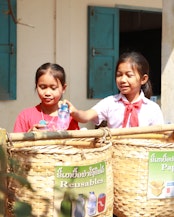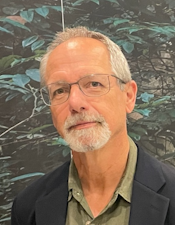Youth engagement and environmental education

Youth engagement and environmental education
- Our Objective
In this project, youth around the Nam Tien protected area are supported to become environmental stewards, helping them address unsustainable land use and natural resource governance. The project supports schools in demonstrating good environmental practices and encourages youth interest in environmental issues through community science projects and teacher capacity building on topics such as biodiversity conservation and climate change.
- Figures
The project was launched on January 1, 2024 and is currently in progress.
Summary
The sustainability of the Nam Tien Provincial Protection Forest in Xayabury Province depends on the environmental stewardship of its surrounding communities. As the next generation of environmental leaders, the youth of Xayabury are at the center of our efforts to nurture sustainability attitudes and practices. That's why the Wyss Academy for Nature’s Hub Southeast Asia works with the local education office, academic institutions, environmental education experts, and the Elephant Conservation Center (ECC) to provide environmental education for youth from local schools around Nam Tien.
Our youth engagement and environmental education project builds the capacity of local teachers, equipping them with knowledge and tools to implement a new environmental education curriculum. This includes training students and teachers in biodiversity conservation, nutritious school gardens, and climate-smart adaptation and risk reduction. We have also improved school infrastructure by installing water filters and waste management facilities, creating an enabling environment for learning and improving environmental conditions.
Through environmental education and field-based learning activities, the goal is have youth leadership in the long-term sustainable management of resources in their communities.
Impact at a glance:
1,316 students and 83 teachers have access to safe drinking water;
264 students, 39 teachers, and 75 villagers trained in waste and school garden management;
30 community leaders, teachers, and parents trained in biodiversity conservation.
Project Connections
- Part of the solutionscape
Ensuring forest stewardship and restoration at cash crop frontiers
Timeline
Kicking off Education of the Future in Nam Tien, Laos
Project Update February 28, 2024
The remote Sayaboury province in Laos has witnessed its forest cover decrease from 71% in 2017 to 58% in 2019. The Nam Tien landscape in the province has also seen large-scale cultivation of monoculture crops for export that is leading to soil degradation and unsustainable land use. Knowledge and tools to find alternative livelihoods and a more sustainable approach to farming are now more important than ever. There is no better time to cultivate environmental education for the future generations, and this is where we come in. Conserving nature while sustaining livelihoods is no simple task but the starting point is to work together, and work for the future. The Wyss Academy Hub Southeast Asia is kicking off environmental education activities in five schools where challenges lie ahead for communities and younger generations. In the remote area in Sayaboury province, Laos, we are working with environmental educators, school directors and teachers to listen to their needs and create linkages between local partners. By connecting the Northern Agriculture and Forestry College (NAFC) in Luang Prabang, Laos with local schools in Nam Tien, we have trained elementary and secondary school teachers and students on waste management, compost-making and growing their own vegetable gardens. In the past, the schools lacked a facility for proper waste management and tended to burn to get rid of the waste, polluting the air with unhealthy toxins that the students would breathe in. Now, with environmental education, teachers and students sort recyclables for sale and sprinkle their vegetable gardens with compost from organic waste.Based on the needs of teachers and schoolchildren, the Wyss Academy Hub Southeast Asia has renovated the five schools to create safe and conducive learning spaces for more environmental education in the future. For example, we have installed water purifiers in the schools to provide safe drinking water and reduce the use of plastic water bottles. This cuts the costs of ordering drinking water that comes in plastic bottles for schools and parents, and kids do not have to carry heavy water bottles from their home to the schools. This is just the beginning. During our last meeting in July with teachers and school directors, together, we came up with a plan for further environmental education in schools. Our environmental educators are going to work with schoolteachers on biodiversity and climate change resilience education. We are excited to work with the future generations, to make schools a hub for environmental engagement and an entry point to the local community.A solution to Nam Tien’s future lies with the children, and it is the way forward.
Team
- Project contactProject contact
Dr. Horst Weyerhäuser
Hub Director
Other Projects in this Solutionscape
Nature-positive land use and livelihood development
Nature-positive land use and livelihood developmentStewardship at forest frontiers—Co-designed knowledge and engagement
Stewardship at forest frontiers—Co-designed knowledge and engagementStakeholder network analysis for systemic transformation
Stakeholder network analysis for systemic transformation





